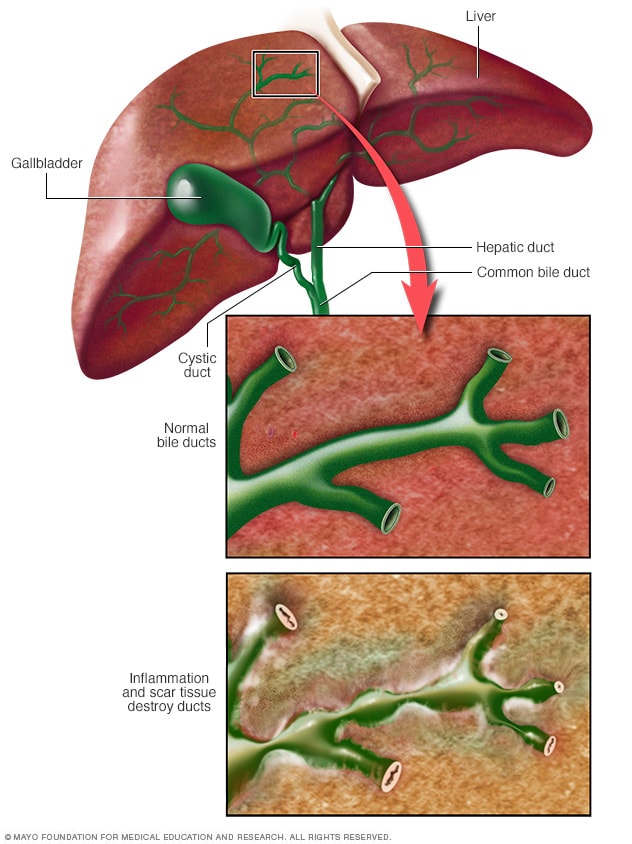Overview
Bile duct damage

Bile duct damage
The bile ducts carry bile from your liver to your small intestine. When bile ducts become damaged, bile can back up into the liver, causing damage to liver cells. This damage can lead to liver failure.
Primary sclerosing (skluh-ROHS-ing) cholangitis (koh-lan-JIE-tis) is a disease of the bile ducts. Bile ducts carry the digestive liquid bile from your liver to your small intestine. In primary sclerosing cholangitis, inflammation causes scars within the bile ducts. These scars make the ducts hard and narrow and gradually cause serious liver damage. A majority of people with primary sclerosing cholangitis also have inflammatory bowel disease, such as ulcerative colitis or Crohn's disease.
In most people with primary sclerosing cholangitis, the disease progresses slowly. It can eventually lead to liver failure, repeated infections, and tumors of the bile duct or liver. A liver transplant is the only known cure for advanced primary sclerosing cholangitis, but the disease may recur in the transplanted liver in a small number of patients.
Care for primary sclerosing cholangitis focuses on monitoring liver function, managing symptoms and, when possible, doing procedures that temporarily open blocked bile ducts.
Products & Services
Symptoms
Primary sclerosing cholangitis is often diagnosed before symptoms appear when a routine blood test or an X-ray taken for an unrelated condition shows liver abnormalities.
Early signs and symptoms often include:
- Fatigue
- Itching
- Yellow eyes and skin (jaundice)
- Abdominal pain
Many people diagnosed with primary sclerosing cholangitis before they have symptoms continue to feel generally well for several years. But there's no reliable way to predict how quickly or slowly the disease will progress for any individual.
Signs and symptoms that may appear as the disease progresses include:
- Fever
- Chills
- Night sweats
- Enlarged liver
- Enlarged spleen
- Weight loss
When to see a doctor
Make an appointment with your doctor if you have severe, unexplained itching on much of your body — itching that persists no matter how much you scratch. Also see your doctor if you feel extremely tired all the time, no matter what you do.
It's particularly important to bring unexplained fatigue and itching to your doctor's attention if you have ulcerative colitis or Crohn's disease, both of which are types of inflammatory bowel disease. A majority of people with primary sclerosing cholangitis also have one of these diseases.
Causes
It's not clear what causes primary sclerosing cholangitis. An immune system reaction to an infection or toxin may trigger the disease in people who are genetically predisposed to it.
A large proportion of people with primary sclerosing cholangitis also have inflammatory bowel disease, an umbrella term that includes ulcerative colitis and Crohn's disease.
Primary sclerosing cholangitis and inflammatory bowel disease don't always appear at the same time, though. In some cases, primary sclerosing cholangitis is present for years before inflammatory bowel disease occurs. If primary sclerosing cholangitis is diagnosed, it's important to look for inflammatory bowel disease because there is a greater risk of colon cancer.
Somewhat less often, people being treated for inflammatory bowel disease turn out to have primary sclerosing cholangitis as well. And rarely, people with primary sclerosing cholangitis develop inflammatory bowel disease only after having a liver transplant.
Risk factors
Factors that may increase the risk of primary sclerosing cholangitis include:
- Age. Primary sclerosing cholangitis can occur at any age, but it's most often diagnosed between the ages of 30 and 40.
- Sex. Primary sclerosing cholangitis occurs more often in men.
- Inflammatory bowel disease. A large proportion of people with primary sclerosing cholangitis also have inflammatory bowel disease.
- Geographical location. People with Northern European heritage have a higher risk of primary sclerosing cholangitis.
Complications
Complications of primary sclerosing cholangitis may include:
- Liver disease and failure. Chronic inflammation of the bile ducts throughout your liver can lead to tissue scarring (cirrhosis), liver cell death and, eventually, loss of liver function.
- Repeated infections. If scarring of the bile ducts slows or stops the flow of bile out of the liver, you may experience frequent infections in the bile ducts. The risk of infection is particularly high after you've had a surgical procedure to expand a badly scarred bile duct or remove a stone blocking a bile duct.
-
Portal hypertension. Your portal vein is the major route for blood flowing from your digestive system into your liver. Portal hypertension refers to high blood pressure in this vein.
Portal hypertension can cause fluid from the liver to leak into your abdominal cavity (ascites). It can also divert blood from the portal vein to other veins, causing these veins to become swollen (varices). Varices are weak veins and tend to bleed easily, which can be life-threatening.
- Thinning bones. People with primary sclerosing cholangitis may experience thinning bones (osteoporosis). Your doctor may recommend a bone density exam to test for osteoporosis every few years. Calcium and vitamin D supplements may be prescribed to help prevent bone loss.
- Bile duct cancer. If you have primary sclerosing cholangitis, you have an increased risk of developing cancer in the bile ducts or gallbladder.
- Colon cancer. People with primary sclerosing cholangitis associated with inflammatory bowel disease have an increased risk of colon cancer. If you've been diagnosed with primary sclerosing cholangitis, your doctor may recommend testing for inflammatory bowel disease, even if you have no signs or symptoms, since the risk of colon cancer is elevated if you have both diseases.